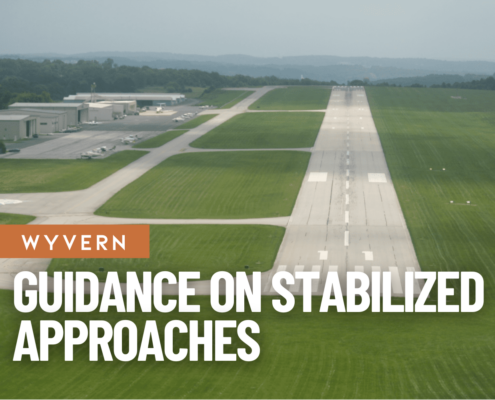
Sharing Safety Guidance on Stabilized Approaches
OpinionRunway excursions remain one of aviation’s most stubborn accident categories, despite years of emphasis on stabilized approaches, defined gates, and widespread encouragement of go-arounds. Most pilots understand the criteria. Far fewer consistently act on them. That gap—between knowing what to do and actually doing it—is the focus of this guidance document from WYVERN.
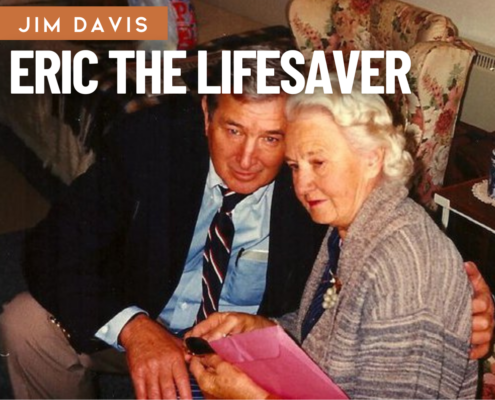
Eric the Lifesaver
I was thereReturning from a routine sales trip, Jim Davis walks into a hangar transformed for a major aviation celebration. What follows involves a notorious uninvited guest, a quiet negotiation, and a man named Eric whose calm authority changes the course of the evening—and possibly more.
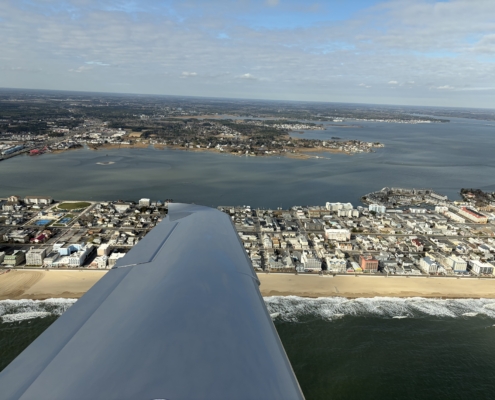
Friday Photo: Ocean City Beach
UncategorizedA flight instructor CFI/CFII requested that I fly this plane with him as takes a deeper dive into the glass cockpit. As he teaches on this plane, he also gets some free hours so he invited me to fly along - what a wonderful Christmas gift this was for me.

Use it or lose it: the instrument rating is not an insurance policy
John's blogOne of the saddest things in aviation is a pilot with an instrument rating who’s afraid to use it. They look at a 1500-foot overcast and realize their $15,000 investment has become nothing more than a souvenir. Maybe they used to fly in the soup all the time and simply fell out of the habit; more likely, they can recite the holding pattern entries from the textbook but have never seen the inside of a cloud. Either way, it’s a waste of money and a missed opportunity.

Do You Have an Abort Point?
I was thereIf your answer is yes—do you religiously follow it? Until recently, I would have said yes without hesitation. Now, I’m not so sure.
A Routine IPC Trip
Every six months, I schedule an IPC with an instructor I’ve flown with for nearly…

My Most Dangerous Flight
Opinion“What’s the most dangerous flight you’ve made?” Non-pilots often expect tales of death-defying aerobatics or wild weather—but for me, danger can be surprisingly subtle. In this story, I share a flight in my Cub over the Dallas–Fort Worth Metroplex at just 1,000 feet AGL, constantly scanning for safe landing spots and dodging traffic alerts. It wasn’t reckless—it was sightseeing low and slow, where the beauty of the country comes with small, inherent risks. A tale of vigilance, preparation, and the quiet thrills of general aviation.
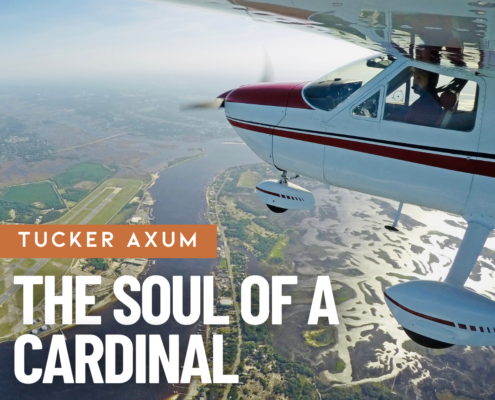
A Higher Purpose: The Soul of a Cardinal
My AdventureThe shiny red-and-white Cessna Cardinal caught my eye with her sleek frame, strutless wings, and wide doors. She whispered that she was the total package for barnstorming across America with my beautiful wife, Heidi, and our new chocolate Labrador. Surely the Cardinal wouldn’t hold it against us that our precious puppy was named Piper—after all, she resembled the bear cub on the tail of a J-3 Cub.

Mission (Im)possible
My AdventurePilots need a mission. Try this! Starting and finishing at the centre of the continent in Manitoba, Canada, you have five days and four nights to journey 3,500 miles, see Niagara Falls, the Statue of Liberty, travel to islands in the Atlantic and each of the Great Lakes (camping on two of them), and check out historical airfields, unique ice cream shops, and restaurants along the way. Do you accept?
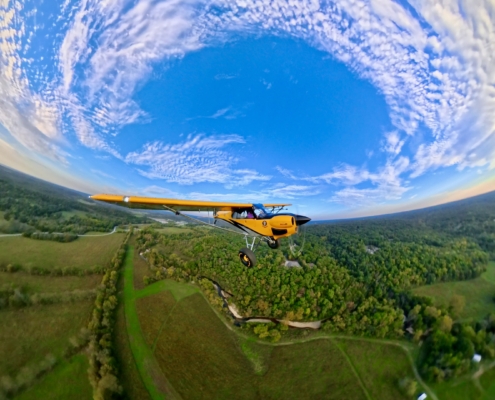
Friday Photo: Clouds Above
Friday PhotoA flight to explore some of the backcountry strips around Northwest Arkansas did not go exactly as planned. Winds were stronger than expected, and they were swirling in the hills. Most of the strips I planned to visit were blown out. I do this for fun, and these landings would not have been fun. So, I just spent a couple of Hobbs Hours flying around and seeing the sights. Sometimes, the best sight is in the sky above.

$100 Hamburger Reflections
OpinionBoredom creates the need for the $100 hamburger. Power pilots often have to invent ways to stay mentally engaged: mastering autopilot, interpreting en-route weather, practicing precision maneuvers, honing navigation skills, flying patterns and go-arounds, upset training, aerobatics, IFR practice, and so on. These exercises are about keeping the mind occupied and the skills sharp—they are less about “having fun.”

Five Aviation Books Every Pilot Should Read
OpinionEditor’s note: Contribuing author, Alex Sack, recently challenged pilots to expand their reading beyond aviation-specific titles (read that article here). That article sparked some thoughtful follow-up, including this response from Jason Blair,…

What Will Your Calling Be?
OpinionA young flight instructor asked me for a ride in my Bonanza, and what started as a simple flight turned into a lesson on responsibility, checklists, and discovering your true calling. Sometimes, one encounter can shape a career—and a life in aviation.

Bearcat to Beercat
I was thereA routine commute in a Grumman F8F Bearcat turns into an unforgettable dogfight—and an unexpected midair surprise. Flying alongside a Navy test pilot, airshow legend Corkey Fornof recounts a moment that perfectly captures the power, personality, and pure fun of warbird flying.

Unnecessary Comments on Short Final
I was thereEn route, we contacted the alert facility for a weather update and learned that conditions had degraded significantly. The weather was barely above ILS minimums, and the snow- and ice-covered runway required us to engage an arresting cable on landing. Fortunately, Galena had three serviceable arresting cables at the approach end of the runway and a midfield cable located a little less than halfway down the preferred landing runway.
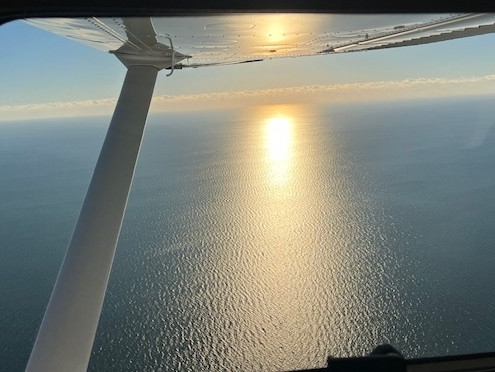
Friday Photo: Sunrise Over the Atlantic
Friday PhotoSeveral times per week I fly back and forth from my home in Ocean Reef (Key Largo) to my office in Fort Lauderdale in my 182. This particular morning at Sunrise was simply awe inspiring. Detached from the earth, the majesty of flight is a profound gift.

A Mooney Pilot’s Night IFR Wake-Up Call with Bob Hamilton
PodcastOn a winter night IFR flight home in his Mooney, fatigue, hunger, and deteriorating weather quietly stacked the odds against pilot Bob Hamilton. As ceilings dropped, icing threatened, and options disappeared, Bob was forced to confront a chain of decisions that led to one of the most intense moments of his flying career—saying “unable” to ATC and trusting his judgment.
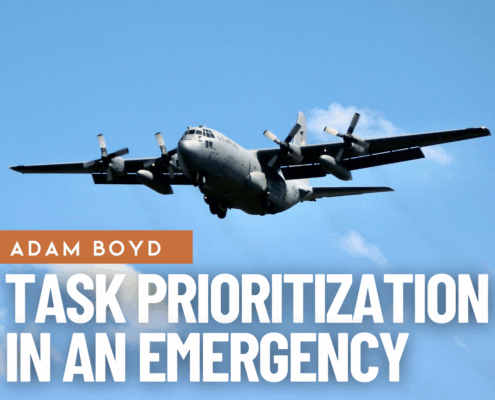
Task Prioritization in a C-130H Emergency
I was thereIn the Air Force we are taught from day one to approach emergencies with a standardized response. The acronym MATL is ingrained in every pilot’s mind. It stands for Maintain Aircraft Control, Analyze the Situation, Take Proper Action, and Land as soon as Conditions Permit. The challenge is staying disciplined when the workload spikes.

Lost and Found
HistoryThere are many fine accounts of the adventures, travails, and tragedies of the men and women who fly. Yet there is always a flight in one’s lifetime that defines us indelibly. This one is legendary but has faded from history; perhaps the shadows of other events seem greater, but it deserves to be retold as a testament to the steely resolve of one Canadian aviator. His will to live serves as an inspiration for all pilots who contemplate resignation in the face of adversity.

Breaking the Chain: Recognizing the Links Before Disaster
OpinionThe first link in the chain began when I was still at home. For reasons that escape my memory, I was over an hour late leaving for the airport. The second link in the chain occurred when I pulled the Scout out of its T-hangar and discovered that I had forgotten to refuel it after my last flight. That meant finding someone to give me a hand-prop while I held the brakes.

The Lovable Con Man
I was thereEric, sometimes known as Farley, was a well-built, dark, handsome brute of about 30. He could—and did—literally charm the pants off every pretty girl within 100 miles of wherever he happened to be that particular evening. He was by far the best salesman Placo ever employed, before or since. At that time, we were selling about one new aircraft a month.
